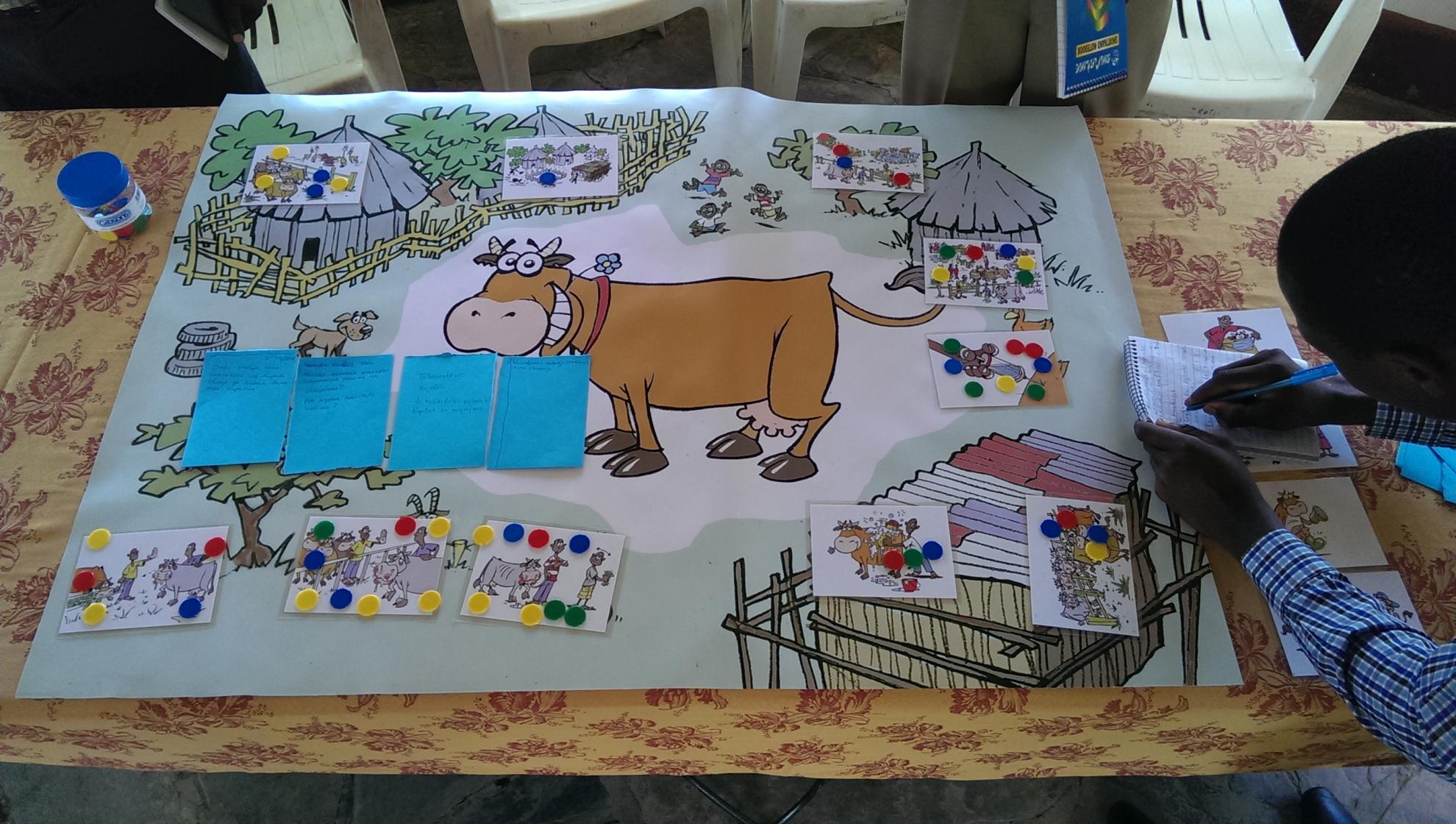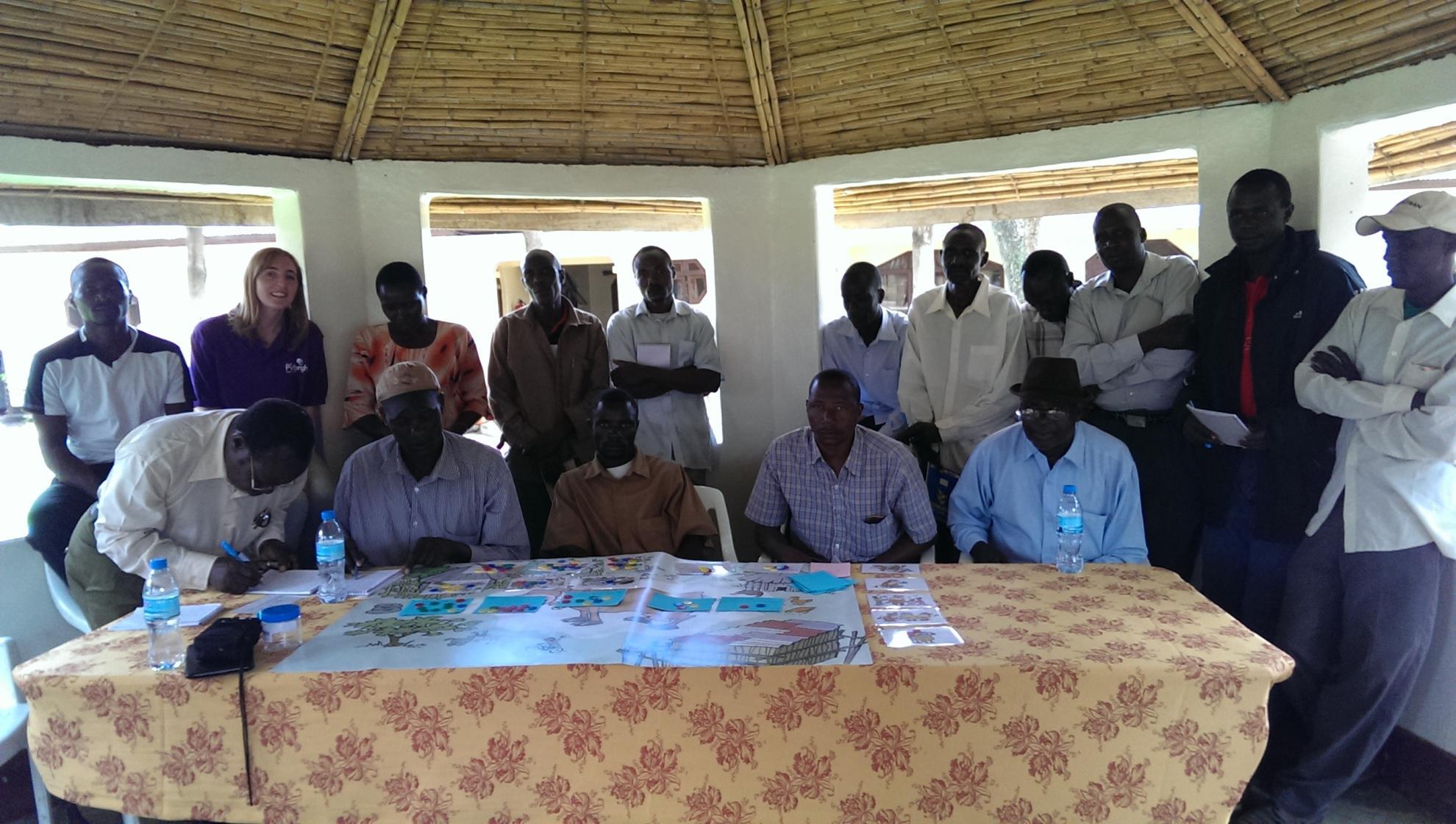Foot-and-mouth disease (FMD) is one of the most significant viral livestock diseases across the world. Reduced fertility, milk production and growth rates are just some of the detrimental effects that infected animals experience, which have devastating effects on agricultural production. The disease is highly infectious and widespread across most of sub-Saharan Africa, where communities are dependent on animals for food, transport and land cultivation.
As the World Reference Laboratory for FMD, The Pirbright Institute is ideally positioned to help tackle the problems these areas have with regular FMD outbreaks. In April 2015, Veronica Fowler and Kasia Bankowska from the Institute joined Tiziana Lembo and Richard Reeve from the University of Glasgow and travelled to Mugumu in northern Tanzania. Their key aim was to carry out a community based workshop that facilitated discussions on how scientists and communities could best work together to improve FMD surveillance and prevention in Africa.
This workshop brought together a range of stakeholders including government-level representation (district veterinary and livestock field officers), village leaders and livestock owners and was facilitated by participatory tools designed by Veronica Fowler. The approach recognised that local people have very rich knowledge about the animals they keep and the infectious diseases that affect their livelihoods. Participants could therefore draw upon their existing knowledge, which, combined with information provided by the researchers, allowed them to advance their understanding of how FMD is transmitted and can be prevented.
While it is clear from earlier studies that cattle vaccination would reduce the burden of disease in these communities, research is still required in order to develop vaccines tailored to viruses circulating in these areas. However, other prevention measures related to the way livestock owners manage their herds are available to the communities and these were discussed at the workshop using very interactive methods that allowed effective blending of local and technical knowledge.
Games were used to illustrate the risk factors involved in FMD spread and the preventative measures that can be taken. The participants were split into three groups where they firstly identified the scenarios they thought were important to either disease spread or disease prevention. Individuals within these groups then used tokens to ‘rank’ the importance of these scenarios. Participants were also provided with blank cards to contribute their own ideas if they wanted to. This approach helped with the exchange of information between those with first-hand experience of the disease and the researchers, enabling gaps to be identified in the information that is relayed between them.

Another participatory activity illustrated the difficulties in vaccinating against the disease in northern Tanzania, where there are four out of the seven types (serotypes) of FMD circulating (O, A, SAT 1 and SAT 2). The participants were given a pool of circulating viruses, with each virus type being represented by a different colour. Syringes were given in the matching colours where vaccines were available, with the aim of matching them to the correct viruses. Some virus colours were present for which there was no matching vaccine to explain the current situation in Tanzania. Great emphasis was placed on the important role played by communities in reporting outbreaks in order to generate samples for virus typing and vaccine selection and production purposes.
Tiziana said that working very closely with local communities and health professionals in Tanzania “has the double advantage of ensuring that research agendas are tailored towards actual needs and that uptake of research findings is optimised towards reductions in disease risks, and therefore increased herd productivity.”
Recently, new diagnostic kits have been developed and validated by the Institute that will be able to improve FMD detection in communities on the ground without the need for cumbersome transportation procedures. The participants at the workshop were provided a demonstration on how some of these test kits (SVANODIP® FMDV-Ag test) could be used to obtain an immediate diagnosis. Further improvements of the kits also have the potential to identify the virus serotype, which is currently being explored at the Institute using material generated as part of research efforts in Tanzania and other parts of Africa. These kits could dramatically reduce the amount of time it takes to obtain and analyse diagnostic results, which would then aid in preventing the spread of FMD and inform vaccine production strategies.
The workshop is part of a collaborative effort between the University of Glasgow, The Pirbright Institute and MSD Animal Health, which funded the workshop through a grant to the University of Glasgow and The Pirbright Institute(Tiziana Lembo, Richard Reeve and Veronica Fowler). The aim of the grant is to strengthen surveillance capacity for FMD in remote Tanzanian locations through direct community engagement and the use of simple field-based diagnostic technologies. Improved surveillance will provide virus data for vaccine development and will allow researchers to determine if outbreaks by a given virus type can be predicted, and control measures can therefore be timed. The workshop was also supported by a Wellcome Trust costed extension to the Afrique One consortium, the Boyd Orr Centre for Population and Ecosystem Health, and a Biotechnology and Biological Sciences Research Council (BBSRC) Sparking Impact award to Veronica Fowler.
The workshop tools provided an effective mechanism to feed back results to the communities from previous research carried out in Tanzania through support by the ‘Combating Infectious Diseases of Livestock for International Development’ (CIDLID) initiative funded by the BBSRC, the Department for International Development, and the Scottish Government. Veronica from the Institute stated that “workshop participants expressed a keen interest in continuing to be involved in research efforts, devising joint solutions and contributing to better communication between researchers and communities.”
The interactive games have consequently been adopted by the key in-country representatives from the MSD Animal Health project (who were facilitators and translators in the workshop) who will run an additional three sessions. “The format of the workshop has already been rolled out to cover other areas in Tanzania, including two pastoralist areas and a rural smallholder setting.” said Tiziana. These workshops are aimed at maintaining the link between scientists and livestock owners whilst additional BBSRC grants are prepared.
